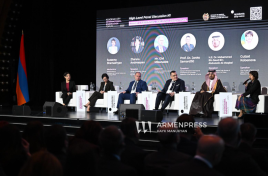Education Leaders from Armenia and Beyond Convene in Yerevan to Drive Innovation and Collaboration
Monday, October 20, 2025
The two-day conference Academic City: International Knowledge Forum 2025 has kicked off in Yerevan, bringing together education and science professionals and officials from Armenia and several other countries.
During the first high-level panel discussion, Georgia’s Minister of Education, Science, and Youth, Givi Mikanadze, said in his remarks that through dialogue and joint efforts it is possible to create a more competitive and global educational environment.
“We are living in a time of unprecedented change, where markets, technologies, and knowledge are interconnected. Therefore, our education systems must not only transmit knowledge but also demonstrate flexibility in responding to challenges. This vision guides Georgia’s ongoing higher education reforms, which are being implemented under the leadership of [Georgian] Prime Minister Irakli Kobakhidze. Our government has developed a comprehensive program for educational reform, addressing current challenges that must be overcome through effective policymaking,” Mikanadze said.
According to Minister Mikanadze, the guiding principles of Georgia’s higher education reforms are internationalization, digital transformation, and close partnership and collaboration with leading foreign universities and research centers.
“For neighboring countries with strategic relations, it is very important to develop cooperation, exchange necessary information and experience in the field of education. Today, we have the opportunity to jointly face challenges and solve common issues through unified efforts. We are interested in learning from our Armenian partners about the progress of educational reforms in Armenia to understand what can be implemented in Georgia as well. Together, we can strengthen each other by demonstrating the successes achieved in our countries and the obstacles overcome during the reform process. This is certainly beneficial for both sides,” the Georgian minister said.
Gulzat Kobenova, Vice Minister of Science and Higher Education of Kazakhstan, said in her speech that the theme of the ongoing conference in Armenia resonates deeply with the Kazakh side.
“If we look at Armenia’s state program for science and education through 2030, it becomes clear that it includes development priorities that are also of paramount importance in Kazakhstan’s adopted state program. Each country has its own development path, but the goals set—especially in the field of higher education—have many similarities. These are challenging times, and the difficulties are particularly significant when it comes to the application of artificial intelligence. Therefore, a key priority should be the active involvement of youth in the process of solving important issues. The role of the state and its responsibility to support young people and provide quality education are extremely important,” the Kazakh official said.
Janko Samardzic, Assistant Minister for International Cooperation and European Integration of Serbia, said in his speech that the Yerevan conference provides a unique opportunity to address the challenges facing the international community in the fields of education and science; therefore, the perspectives and responses expressed on these vital issues are extremely important.
“Education is not merely a fundamental human right; it provides the opportunity to realize one’s potential. Therefore, it is essential to strengthen society together through education. In this regard, the reform process is continuous, taking into account the challenges in the field and technological changes. It is the responsibility of states to anticipate these changes and implement reforms within a broad social context, turning them into concrete actions and measures. Only then will the set goals be achieved. To overcome challenges, governments and universities reform curricula while establishing strong partnerships with partners. Education must become more inclusive and align with current demands as well as national development goals,” Mr. Samardzic said.
Dr. Mohammed bin Saud bin Abdulaziz Al-Moqbel, Director-General of Arab Bureau of Education for the Gulf States, noted that his organization includes seven Arab countries, with branches in Riyadh and Doha, while the education research center is located in Kuwait. The organization has a specialized educational strategy that helps develop and modernize educational programs, particularly the teaching of Arabic in the Gulf countries.
He expressed hope that the Yerevan conference will inspire new ideas related to educational system reforms and sectoral cooperation.
“Our universities offer a variety of specializations and benefit from a new educational strategy that provides the younger generation with relevant knowledge and sufficient skills. Today, technologies are evolving rapidly, so it is important to approach them correctly. At the same time, we must consider professional ethics, especially when using technologies like artificial intelligence. Currently, the Gulf countries offer great opportunities for international students, who can come and study at prestigious and high-quality universities in the region. In other words, this creates opportunities for knowledge exchange. We are also preparing to open research centers for international lecturers and to develop joint programs with them that will support specialists and policymakers,” Dr. Mohammed bin Saud bin Abdulaziz Al-Moqbel said.
Published by Armenpress, original at https://armenpress.am/en/article/1232588





